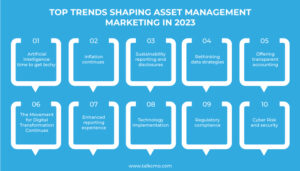In the industry’s risk-reward analysis, those who do not adapt risk falling behind, whereas those who do adapt can reap substantial rewards.
Smaller and up-and-coming asset managers need to find new ways to adapt in light of the heightened competitive market pressures and the prognosis of continued volatility. Firms are urgently re-evaluating their operating models and seeking to differentiate their services in the face of sustained fee pressure and shifting investor product demand.
Large-scale changes to client data and privacy will take place in 2023.  Having a plan, developing client relationships, and acquiring zero-party data will help organizations keep their asset management strategies one step ahead of the opposition. Adopting AI technology and purpose-driven branding will ensure that brands remain competitive in a crowded market. The leading trends include an increased reliance on artificial intelligence (AI) and the significance of purpose-driven branding.
Having a plan, developing client relationships, and acquiring zero-party data will help organizations keep their asset management strategies one step ahead of the opposition. Adopting AI technology and purpose-driven branding will ensure that brands remain competitive in a crowded market. The leading trends include an increased reliance on artificial intelligence (AI) and the significance of purpose-driven branding.
As the new year approaches, brands must anticipate emerging asset management marketing trends in 2023.
From the top down: the revival of active management
The goldilocks period for assets abruptly ended in 2022, ushering in a new world order after a decade of globalization, easy money, muted inflation, and political liberalization. Active managers should have opportunities to demonstrate value addition by fusing top-down and bottom-up analysis as a result of this. In-depth research is necessary but insufficient in capturing unique company-level factors. The change in the macro environment has been so fundamental that it will render conventional investment strategies and rules of thumb obsolete. Instead, those managers who can incorporate a comprehensive understanding of macroeconomic and financial interdependencies into their investment decisions will generate the most value. As a result, active managers ought to have chances to show how they add value by combining top-down and bottom-up analysis. Comprehensive bottom-up research is required but falls short of identifying specific company-level factors.
Also Read: B2B Demand Generation Trends
Artificial intelligence: time to get techy
AI technology has been in the news over the past few years, but financial marketers have never viewed it as a crucial component of their strategies. Adopting AI technology is essential if marketers wish to remain competitive in 2023 and beyond and maintain forward momentum in their digital marketing. AI technology is ideal for marketing strategy curation, automation, optimization, and personalization. As clients continue to demand better, more personalized digital experiences, AI is the only way for an organization to meet these demands.
Inflation continues
The multi-decade high inflation levels significantly affect asset managers’ operating expenses, from data and technology costs to salaries. To reduce costs, it is compelling the industry to re-evaluate its processes, operating structures, and technology cost of ownership. In areas such as risk management, firms are increasingly seeking efficiencies through outsourcing service providers. Divergent opinions exist regarding the duration of inflation’s stay, but asset managers must devise novel strategies to protect against its worst effects as long as it persists. Previously unpopular strategies, asset classes, and geographies have begun to come back.
Sustainability reporting and disclosures
The interest in ESG funds has increased exponentially over the past few years, and there are no indications that this trend will change by 2023. However, not only inflows have been growing. As policymakers pay more attention to ESG concerns, pressure on asset managers to provide more data and consistent reporting regarding ESG investments has increased. In addition to the ongoing implementation of SFDR Level 2, the EU taxonomy and MiFID II sustainability preferences have been added to the growing list of ESG regulations that asset managers must comply with.
Rethinking data strategies
Asset managers are re-evaluating their data strategies to eliminate internal data silos and improve the quality of data used for portfolio analysis and client and regulatory reporting as firms seek operational efficiencies.
Data is also the fuel for all-around performance and risk reporting. In the current market environment, when some managers are experiencing underperformance, it is more important than ever to provide it accurately and promptly. The ability to rapidly aggregate data across systems enables managers to quickly identify the performance drivers and detractors within a portfolio and thoroughly comprehend exposures and risks.
Offering transparent accounting
Transparent reporting is essential in retaining investors, exceptionally when performance has deteriorated. Alongside their investment teams, non-investment groups that value high-quality client service will have a substantial say in the decision to redeem from a manager. Investors will require reassurance that any underperformance is temporary, particularly for volatile strategies that need a complete cycle to deliver. Transparent and straightforward reporting goes a long way toward establishing this confidence.
The Movement for Digital Transformation Continues
For long-term competitiveness, asset management firms require a suitable technology stack. It involves replacing older, less practical systems with a cloud-based, all-in-one setup. Utilize financial technology to expand and grow the business model: service more clients with fewer resources, spend more time acquiring clients, and market the company. Utilize the technology also to enhance internal collaboration and workflows. Adopt more efficient cloud-based technologies, such as a data warehouse, trade order management system, portfolio accounting system, customer relationship management system, compliance reporting system, etc.
Enhanced reporting experience
An exceptional reporting experience can go a long way toward establishing brand credentials, cultivating devoted clients, and drawing new mandates as the competition for capital increases. Investors favor managers who can react quickly to ad hoc requests, offer a near-real-time view of top-level performance and risk metrics, and have the capability of viewing specifics at the level of a single security. The provision of static, periodic reports is no longer sufficient for asset managers seeking to differentiate their service offerings.
Technology implementation
In volatile markets and fierce competition, asset managers must be adaptable. Cloud-based investment management software enables smaller and up-and-coming asset managers to automate cumbersome risk management and reporting workflows while providing clients a significantly enhanced reporting experience. Asset managers have never been more reliant on discovering efficiencies and reclaiming time for higher-value portfolio analysis and business development initiatives.
Regulatory compliance
Many registered investment advisors rely on a chief compliance officer or outsource these responsibilities to an external firm as they devote more time to compliance. Traditional risks in the asset management sector include marketing, who can invest, and fees. More recent exam findings in portfolio management and trading, valuation, custody, use of leverage, funding capacity, voting and consent solicitations, recordkeeping, and technology issues also need to be considered.
Cyber Risk and security
Many investors believe that their data will remain private and secure. As with any other industry, however, asset managers must consider cybersecurity and risk management of their customer data, as well as the potentially disastrous effects of a lack of investment in these areas on their business. Along with the risk of losing proprietary intelligence and a competitive edge, the risk of a data breach or loss of sensitive client and employee data can severely blow an asset manager’s brand and investors’ trust. Even though violations may not result in regulatory issues, investors’ desire to continue working with the asset manager will be affected.
The pandemic has accelerated the industry-wide transformation that asset management is experiencing. Amid these significant changes in the asset management industry, businesses that remain adaptable and attuned to shifting customer demands will be best positioned for success. In the industry’s risk-reward analysis, those who do not adapt, risk falling behind, whereas those who do adapt can reap substantial rewards.
For more such updates follow us on Google News TalkCMO News.





